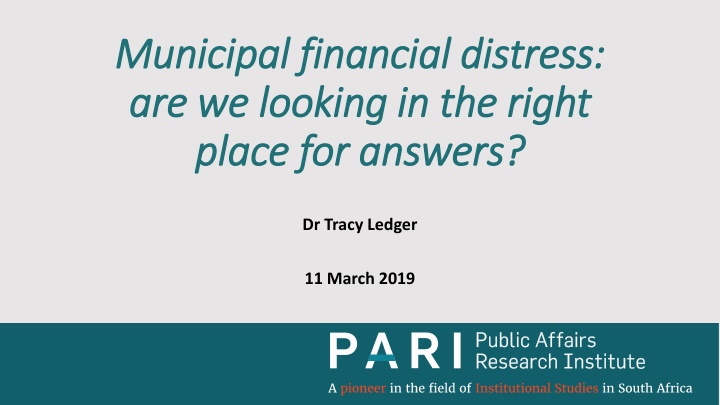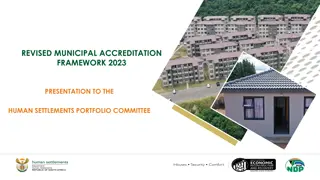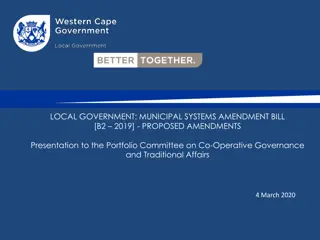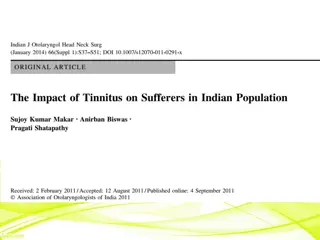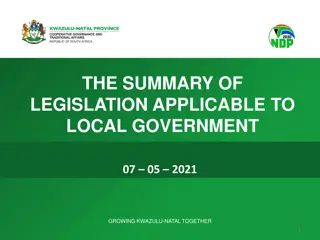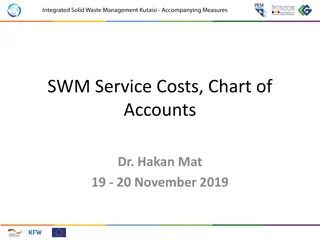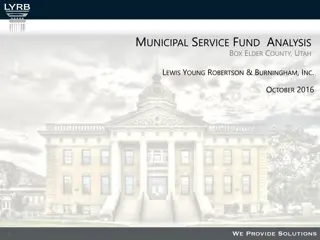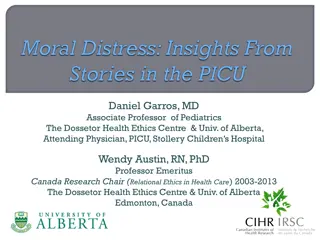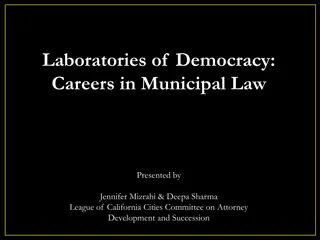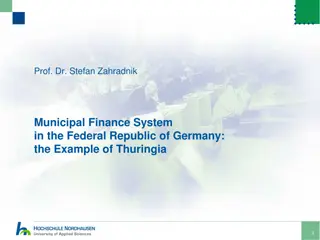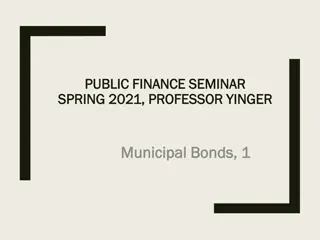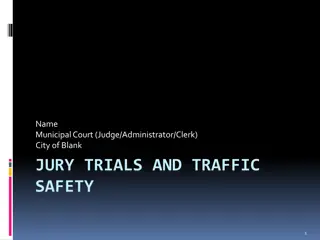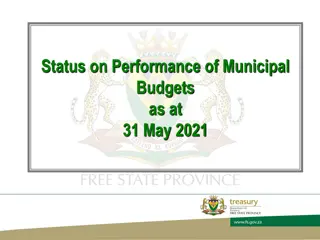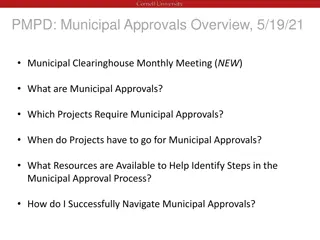Municipal Financial Distress: Are We Looking in the Right Place for Answers?
There is significant empirical evidence of financial distress in local government, with issues like unfunded budgets, deficit municipalities, and underfunding of basic services and infrastructure. The popular narratives surrounding financial mismanagement, non-payment by consumers, and collection of outstanding accounts further complicate the situation.
Download Presentation

Please find below an Image/Link to download the presentation.
The content on the website is provided AS IS for your information and personal use only. It may not be sold, licensed, or shared on other websites without obtaining consent from the author.If you encounter any issues during the download, it is possible that the publisher has removed the file from their server.
You are allowed to download the files provided on this website for personal or commercial use, subject to the condition that they are used lawfully. All files are the property of their respective owners.
The content on the website is provided AS IS for your information and personal use only. It may not be sold, licensed, or shared on other websites without obtaining consent from the author.
E N D
Presentation Transcript
Municipal financial distress: Municipal financial distress: are we looking in the right are we looking in the right place for answers? place for answers? Dr Tracy Ledger 11 March 2019
THE BOTTOM LINE THE BOTTOM LINE There is significant empirical evidence of the financial distress of a growing part of local government: COGTA s list of unfunded budgets, the AGSA s list of deficit municipalities. Recent work that we have completed suggests that the LGES needed to be some R56 billion R68 billion higher in the current year for local government to be fully funded, a considerable portion of that being for operational expenditure Maintenance is being neglected we will all get to pay for that Unfunded mandates Under-funding of basic services Under funding of basic capex requirements What has gone wrong?
THE POPULAR NARRATIVES THE POPULAR NARRATIVES - - 1 1 LOCAL GOVERNMENT IS A SITE OF EXTREME FINANCIAL MIS- MANAGEMENT AND WASTE OF RESOURCES While any money lost to mismanagement or poor management of resources is to be avoided, reality is very different. F&WE: 0.45% of total expenditure R28.4 billion in irregular expenditure (8.6%). Most of this represents relatively minor compliance issues, and the AGSA is clear that in most cases goods and services are procured R12.6 billion in unauthorised expenditure (3.8%). This represents in large part poor planning, and not gross misuse of funds
THE POPULAR NARRATIVES THE POPULAR NARRATIVES - - 2 2 CONSUMERS ARE NOT PAYING THEIR ACCOUNTS BECAUSE OF A CULTURE OF NON-PAYMENT Municipal accounts are simply unaffordable to a significant percentage of households: 80% of households cannot afford a nutritionally balanced basket of food The indigency waiver only covers a fraction of households who need it, and allocations are way too small for larger households Rapid increases in the cost of electricity Some households don t receive accounts at all, due to factors outside the control of the municipality A significant number of municipalities find themselves in a situation where they are constitutionally obliged to deliver services to people who simply cannot afford to pay for them.
THE POPULAR NARRATIVES THE POPULAR NARRATIVES - - 3 3 MUNICIPALITIES ARE NOT TRYING HARD ENOUGH TO COLLECT OUTSTANDING ACCOUNTS The main tool available to collect money is electricity disconnection (the White Paper recognised this and recommended that municipalities MUST retain the right of electricity disconnection). Eskom currently supplies electricity to 50% of South African households, effectively putting these households out of reach of this enforcement mechanism. The biggest loser is water accounts Other organs of state owe local government R8bn no equitable share witholding for them! Some municipalities will never cover their operating costs, even if everyone pays their account
SO WHAT SO WHAT IS IS THE PROBLEM? THE PROBLEM? Many of the most important assumptions made in the White Paper about the own revenue raising ability of local government have proven to be inaccurate. In addition, other critical assumptions about the functioning of local government have either not been implemented, or have not been clarified. As a result, estimates of local government s ability to raise its own revenue made in 1997 can now be seen to have been wildly inaccurate. The White Paper had nothing to say about how we should deal with the situation we now find ourselves in: where so many households simply cannot afford to pay for services, and expenditure obligations have increased exponentially
SO WHAT SO WHAT IS IS THE PROBLEM? THE PROBLEM? The White Paper assumed that the LGES would ALWAYS be sufficient to balance the books thus financial viability was not a critical factor for demarcation It had nothing to say about what we should do when we find ourselves with a R56 billion hole in the budget This is not intended as a criticism of the White Paper itself: local government in post-apartheid South Africa represented a step into the unknown, and many assumptions had to be made without the benefit of empirical evidence. The problem is not the White Paper, but rather the ongoing omission to review it in the light of 20 years of empirical evidence.
CONCLUSIONS CONCLUSIONS The correct place to look for the financial distress of municipalities is the fiscal framework foundation on which they have been built We need a new White Paper and a REAL commitment to financially viable local government: Eskom restructuring Powers and functions Regulatory burden Provincial and national failure to implement S 139 of the Constitution Outstanding accounts Maintenance and physical distribution losses require an emergency response.
Thank you Thank you
